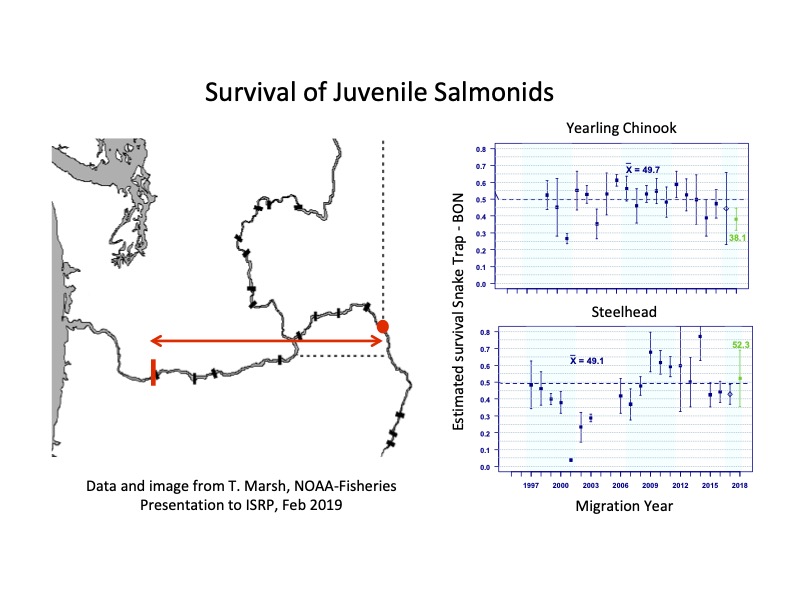forum
library
tutorial
contact

Oregon Workers Need
the Snake River Dams
by Cheri Helt
The Register-Guard, August 28, 2022
|
the film forum library tutorial contact |

|
Oregon Workers Need
by Cheri Helt
|
96% of spring juvenile salmon survive passage through the dams, and
summer migrating fish survival is 93%. (see NOAA Fisheries graphic below)
 Oregon working families are caught in the tightening vice of inflation, paying record sums for gasoline, utilities, groceries and other necessities. Despite healthy wage gains, the median wage for working Oregonians, when adjusted for inflation, is declining. Working Oregonians can afford less now than they could a year ago. Economist Milton Friedman called inflation "the cruelest tax" because it saps buying power from consumers. Oregonians need the cruelty to end, and now.
Oregon working families are caught in the tightening vice of inflation, paying record sums for gasoline, utilities, groceries and other necessities. Despite healthy wage gains, the median wage for working Oregonians, when adjusted for inflation, is declining. Working Oregonians can afford less now than they could a year ago. Economist Milton Friedman called inflation "the cruelest tax" because it saps buying power from consumers. Oregonians need the cruelty to end, and now.
Restraining inflation and giving working Oregonians a rescue line should be the top job of our government. Unfortunately, Gov. Kate Brown is doing exactly the opposite, endorsing a plan to remove four hydroelectric dams on the Snake River that provide cheap electricity to one million Oregonians. Her plan would cost electricity consumers in the Northwest up to $860 million per year through 2045. The resulting electricity bill hikes are estimated at between $100 to $230 per year for households that currently use power from the dams.
If Brown has her way, working Oregonians will not only pay more for electricity at home, but also they will face diminished job prospects as one of Oregon's few economic competitive advantages -- cheap electricity from hydroelectric dams -- evaporates. Workers need jobs, and many of the high-technology, manufacturing and small business jobs in our state are reliant on affordable electricity. Tearing out the Snake River dams would further squeeze working Oregonians at exactly the time they desperately need relief.
Brown says we must remove the Snake River dams in order to help increase the state's salmon population. This is a laudable goal, but the modernized and retrofitted dams are, in truth, remarkably salmon-friendly. A study by the Bonneville Power Administration, the federal agency that operates the dams, found that 96% of spring juvenile salmon survive passage through the dams, and summer migrating fish survival is 93%. These numbers have been bolstered in recent years by millions of dollars of investment in fish-passage technologies.
On the other side of the environmental ledger, the Snake River dams are an essential tool to combat climate change. The Snake River dams alone generate enough electricity to power the entire city of Seattle, or Portland, and then some. The removal of those dams -- the cost of just the removal itself is estimated at $1.24 to $2 billion -- would deprive our electrical grid of a large, reliable source of renewable, climate-friendly generating capacity.
The reliability of the dams' generating capacity is especially critical during extreme weather events such as the ice storm of 2019 and the prolonged heat wave in 2021. During periods when demand for electricity is high, and some other power sources are unable to operate, the Snake River dams, like the other hydroelectric dams in the Columbia River system, literally kept the lights on for countless Oregonians. States like California and Texas have suffered from brown-outs during periods of high demand and extreme weather events. Removing the Snake River dams would increase the likelihood of Oregon suffering the same fate.
Oregon's leaders must stand up for workers in these uncertain, inflationary times. Tearing out the Snake River dams would increase the cost of living of working families when they can least afford it, eliminate a huge source of climate-friendly electricity, degrade the reliability of our grid and have little impact on salmon. Dam removal is an extreme and harmful policy when Oregon workers and small businesses need balanced decision-making.
Oregon working families have long been ignored by Salem and by our representatives in Washington, D.C., and they are suffering the consequences. Removal of the Snake River dams would add insult to injury. We cannot afford that.
Related Pages:
We Can Have Our Salmon and Eat It, Too by Walt Pollock, The Register-Guard, 9/2/21
learn more on topics covered in the film
see the video
read the script
learn the songs
discussion forum
